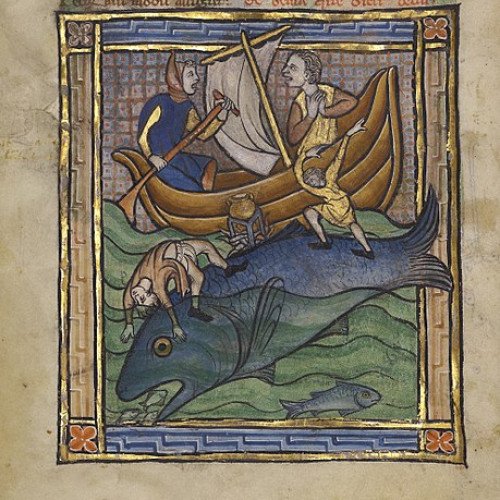Vote on Mythical creatures: Aspidochelone vs Jörmungandr

Aspidochelone
According to the tradition of the Physiologus and medieval bestiaries, the aspidochelone is a fabled sea creature, variously described as a large whale or vast sea turtle, and a giant sea monster with huge spines on the ridge of its back. No matter what form it is, it is always described as being huge where it is often mistaken for an island and appears to be rocky with crevices and valleys with trees and greenery and having sand dunes all over it. The name aspidochelone appears to be a compound word combining Greek aspis (which means either "asp" or "shield"), and chelone, the turtle. It rises to the surface from the depths of the sea, and entices unwitting sailors with its island appearance to make landfall on its huge shell and then the whale is able to pull them under the ocean, ship and all the people, drowning them. It also emits a sweet smell that lures fish into its trap where it then devours them. In the moralistic allegory of the Physiologus and bestiary tradition, the aspidochelone represents Satan, who deceives those whom he seeks to devour.Accounts of seafarers' encounters with gigantic fish appear in various other works, including the Book of Jonah, The Adventures of Pinocchio, and the Baron Munchausen stories.
Statistics for this Xoptio

Jörmungandr
In Norse mythology, Jörmungandr (Old Norse: Jǫrmungandr, pronounced [ˈjɔrmunˌɡandr̥], meaning "huge monster"), also known as the Midgard (World) Serpent (Old Norse: Miðgarðsormr), is a sea serpent, the middle child of the giantess Angrboða and Loki. According to the Prose Edda, Odin took Loki's three children by Angrboða—the wolf Fenrir, Hel, and Jörmungandr—and tossed Jörmungandr into the great ocean that encircles Midgard.[2] The serpent grew so large that it was able to surround the Earth and grasp its own tail.[2] As a result, it received the name of World Serpent. When it releases its tail, Ragnarök will begin. Jörmungandr's arch-enemy is the thunder-god, Thor. It is an example of an ouroboros.